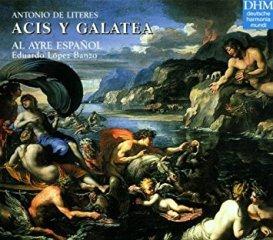Antonio de Literes - Acis y Galatea (2001)
Antonio de Literes - Acis y Galatea (2001)

1.Non hay otras iras que deban temerse 2.Ay de aquel que desprecia! 3.Suspende las iras 4.Sientan los que sienten 5.Muda copia 6.Pues que Polifemo 7.Confiado jilguerillo 8.Divina Galatea 9.Joven galán 10.Con que en tu nobleza...? 11.Al aire de los suspiros 12.Estrafalaria deidad 13.Ayer, cuando la tarde 14.Dulce Galatea 15.Estos duces cánticos 16.Ten el acento! 17.Al ameno silencio 18.Qué poco a asustar llega 19.Aunque contra mí indignado 20.Huid de las iras del monstruo indignado 21.Qué demonios es esto? 22.Qzeda en paz 23.Númenes del mar sagrado 24.Acis dichoso 25.Viva quien hace siglos de dichas sus anos Al Ayre Español Eduardo Lopez Banzo - conductor
Accis y Galatea was first performed in the Royal Palace in Madrid in 1708. It quickly became one of the most famous of zarzuelas, the Spanish music-drama form that flourished in the late Baroque. Zarzuelas were a blend of sung and spoken episodes, usually performed by women actors who took both male and female roles. In the hands of Antonio Literes, director of court music, the zarzuela's musical content became increasingly sophisticated: he wove together French and Italian influences with Spanish traditional and vernacular musics, creating fast-moving scores that smoothly integrated a brilliant array of song-forms. This version of Accis y Galatea (which omits the spoken episodes) is the seventh release in Al Ayre Espanol's excellent survey of Spanish Baroque music. The care and expertise lavished on previous discs is again evident, with Marta Almajano's fine Galatea receiving vivid support from Lola Casariego's Acis, Xenia Meijer's Glauco and the small group of instrumentalists. The result is a bravura performance: ancient lamento, folk seguidillas and Italianate da capo arias jostle together, guitars and castanets mingle with obbligato violins. And all are carried along in a thrilling rhythmic flow that leaves the listener giddy with pleasure while confirming Literes as one of the Baroque's major composers. ---BBC Review
During the first half of the 17th century the Spanish zarzuela, a play with a mixture of spoken and sung dialogue, was transformed from court entertainment to public theatre. Antonio Literes, probably the most original composer in the genre, was an important figure in this shift, mainly because of the enormous popularity of just one of his four surviving zarzuela s, Acis y Galatea. Composed for performance at court in 1708, its text retells the story, much used by 17th- and 18th-century composers for the stage, of the love between the sea-nymph Galatea and the shepherd Acis, and the jealousy that this provoked in the grotesque Cyclops, Polyphemus. The settings by Lully and Handel are the best known, but that by Literes also has a place in the story of the reception of the tale, most familiar to audiences from its appearance in Ovid’s Metamorphoses. Even in Spain this piece is little known and rarely performed, and its revival by Al Ayre Espanol directed by Eduardo Lopez Banzo, the foremost interpreters of Spanish baroque music, is greatly to be welcomed. This ensemble have already acquired a justly deserved reputation for their imaginative and ambitious performances of rediscovered works, performed on either baroque instruments or copies, and this latest record in the series will undoubtedly delight their growing band of devotees. There is great charm and inventiveness in this music, which ingeniously blends elements of Spanish tradition with Italianate gestures, and Al Ayre Espanol respond with a reading that is fresh and direct, with the contrasting situations and characters inherent in the text vividly portrayed.
In a cast dominated by women (including the role of Acis, brilliantly sung by Lola Casariego), Jordi Ricart puts in a virtuoso double performance as Momo the clown as well as Polifemo, with a notable characterisation of the latter in his brief comic solo ‘Dulce Galatea’. Lopez Banzo does not linger, there is some fine playing from the group (even if the local colour of castanets and guitar is a little overapplied), and the fast-moving choruses which frame the piece are done with verve. --- gramophone.co.uk
download (mp3 @320 kbs):








